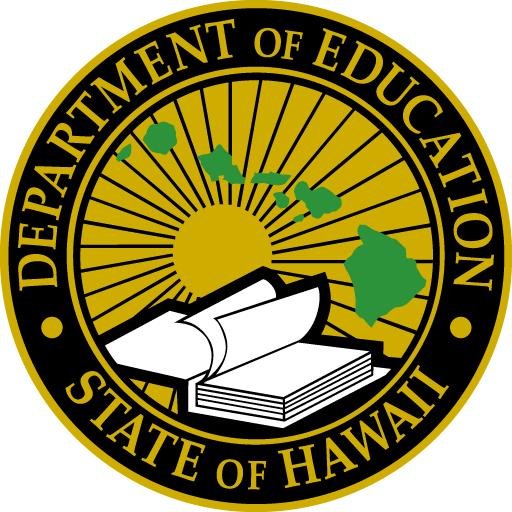E ola pono. E mālama i nā piko.
Live pono. Nurture thriving connections.
While the primary focus of health education is the development of health skills, these skills must be addressed in conjunction with functional information in the context of priority risk topics. Standards-based health education must be age and developmentally appropriate, medically accurate and provide factual information in all priority risk topics:
- Mental and emotional health
- Healthy eating and physical activity
- Personal health and wellness
- Kaluwasan (dili tinuyo nga paglikay sa kadaot)
- Paglikay sa kapintasan
- Paglikay sa paggamit sa tabako
- Paglikay sa alkohol ug uban pang paggamit sa droga
- Sexual health and responsibility
Mubo nga sulat: Edukasyon sa panglawas in prekindergarten is aligned to the Hawai'i Early Learning and Development Standards (HELDS).
Mga Kinahanglanon sa Kurso
- Edukasyon sa panglawas is required in all elementary grades.
- Middle/intermediate schools must offer courses that allow all students to meet Hawaiʻi՚s health education standards and performance indicators for grades 6-8. One semester (0.5 credits; 60 hours) of health education in each middle/intermediate school grade is strongly recommended but not required.
- In high school, a one semester course (0.5 credits; 60 hours) in health education is required for graduation.
- A variety of health specialized elective courses (e.g., peer education) are available at the secondary school level.
- Para sa promosyon sa tungatungang eskwelahan ug mga kinahanglanon sa gradwasyon sa hayskul, tan-awa ang Board Policy 105-1 Academic Program (PDF), Board Policy 102-9 Middle Level Edukasyon Promotion Policy (PDF), ug Board Policy 102-15 High School Graduation Requirements and Commencement (PDF).
wellness guidelines for Edukasyon sa Panglawas
Comprehensive health education provides the instructional foundation that prepares students to build healthy relationships and make lifelong healthy decisions. The mga giya sa kahimsog support quality health education grounded in Hawaiʻi.
The wellness guidelines for health education are organized around tulo ka importanteng sangkap that address instructional minutes, include nutrition education, and emphasize culturally relevant and ʻāina-based approaches:
- Instructional content of health education classes includes a focus on knowledge and skills that support healthy eating and is aligned with the HIDOE standards for health education.
- Edukasyon sa panglawas is provided to students in elementary grades at least 45 minutes per week and secondary grades at least 200 minutes per week.
- Nutrition education includes culturally relevant activities that are ʻāina-based and hands-on, such as food preparation, taste-testing, farm visits and school gardens.
Sexual Edukasyon sa Panglawas
Comprehensive sexual health education helps students understand and navigate their development and growth as they progress from childhood through puberty and adolescence. Effective, comprehensive sexual health education provides students with the age-appropriate, medically accurate content and skills to know and be able to communicate for healthy relationships, access resources and support, and make healthy decisions.
Several state laws and policies help prevent teen pregnancy and the spread of sexually transmitted infections through comprehensive sexual health education.
- Balaod sa estado (Hawaiʻi Revised Statutes (HRS) §321-11.1) establishes requirements for any state-funded sexual health education program.
- Board Policy 103-5 Sexual Edukasyon sa Panglawas (PDF) requires the Department to implement comprehensive sexual health education.
- Ang usa ka deskripsyon sa kurikulum nga gigamit sa eskwelahan mahimong magamit sa mga ginikanan/legal nga tigbantay ug i-post sa website sa eskwelahan sa dili pa magsugod ang bisan unsang pagtudlo.
- A student shall be excused from sexual health instruction only upon the prior written request of the student’s parent or legal guardian.
- Ang usa ka estudyante mahimong dili ipailalom sa aksyong pagdisiplina, silot sa akademiko, o uban pang silot kung ang ginikanan o legal nga tigbantay sa estudyante mohimo sa ingon nga sinulat nga hangyo.
Parents or legal guardians can also opt-out of having their children participate in instruction related to controversial issues.
Ang mga ginikanan o legal nga mga magbalantay mahimong magsulat og sulat ngadto sa mga administrador sa eskwelahan o sa usa ka magtutudlo aron ang ilang anak dili iapil sa usa ka piho nga leksyon o kalihokan. Kung madawat ang ingon nga sulat, ang estudyante kinahanglan hatagan usa ka alternatibo nga kalihokan sa pagkat-on. Ang mga ginikanan o mga legal nga magbalantay adunay obligasyon sa pagpahibalo sa tagdumala sa eskwelahan o magtutudlo sa dili pa ang leksyon o kalihokan.
Recommended instructional materials:
- FLASH (PDF)
- Get Real (PDF)
- HealthSmart (PDF)
- Pono Choices (PDF)
- Positive Prevention PLUS (PDF)
- Reducing the Risk with the Supplement (PDF)
- Rights, Respect, Responsibility (PDF)
Learn more about Sexual Edukasyon sa Panglawas in the HIDOE (PDF)
Sexual Violence Prevention Edukasyon
Teaching students about sexual violence prevention is essential for nurturing safe and caring schools and communities. It equips students with information and skills that promote healthy relationships and respect for others. It also helps students understand how to seek support if they or someone they know experiences sexual violence.
Prevention-oriented and developmentally-appropriate sexual violence prevention instruction to students addresses:
- bodily autonomy (e.g., body awareness and safety, consent, boundaries),
- recognizing and reporting sexual abuse, and
- accessible resources (e.g., trusted adults, community resources).
Department schools will be responsible for providing a description of the curriculum on their public-facing websites. Before the start of instruction to students, schools will notify parents and legal guardians about the upcoming instruction, how to preview the school’s materials, and the opt-out process.
A student shall be excused from sexual violence prevention instruction only upon the prior written request of the student’s parent or legal guardian. A student may not be subject to disciplinary action, academic penalty, or other sanctions if the student’s parent or legal guardian makes a written request.
Approved instructional materials:
- Elevatus Training Curriculum: Sexuality Edukasyon for People with Developmental Disabilities, Adapted for People with High Support Learning Needs (PDF)
- Fight Child Abuse (PDF)
- HealthSmart (PDF)
- Mad Hatter Wellness Curricula (PDF)
- NetSmartz (PDF)
- Positive Prevention PLUS, Special Populations (PDF)
- Rights, Respect, Responsibility (PDF)
- Second Step Child Protection Unit (PDF)
- The Sex Abuse Treatment Center’s Sexual Abuse Prevention Curricula (PDF)
Learn more about Sexual Violence Prevention in HIDOE.
general health education Mga kapanguhaan
- Why Edukasyon sa Panglawas Matters (Google Doc)
- Edukasyon sa Panglawas Standards and Topics Overview (Google Doc)
- Learning Design for Panglawas
- Edukasyon sa Panglawas Printables (Google Drive)
- Mga Giya sa Kaayohan
- You Matter! Panglawas Mga kapanguhaan
- Using School Gardens in Edukasyon sa Panglawas
- Reviewing Instructional Materials for Edukasyon sa Panglawas (PDF)
- 2022 Hawaiʻi School Panglawas Profiles – Highlights Report (PDF)
USDA NON DISCRIMINATION STATEMENT
Subay sa federal civil rights law ug US Department of Agriculture (USDA) civil rights regulations and policies, kini nga institusyon gidid-an sa pagpihig pinasikad sa rasa, kolor, nasudnong gigikanan, sekso (lakip ang gender identity ug sexual orientation), pagkabaldado, edad, o pagbalos o pagbalos sa naunang kalihokan sa katungod sa sibil.
Ang impormasyon sa programa mahimong magamit sa mga pinulongan gawas sa English. Ang mga tawo nga adunay mga kakulangan nga nanginahanglan og alternatibong paagi sa komunikasyon aron makakuha og impormasyon sa programa (pananglitan, Braille, dako nga print, audiotape, American Sign Language), kinahanglan nga mokontak sa responsableng estado o lokal nga ahensya nga nagdumala sa programa o TARGET Center sa USDA sa (202) 720-2600 (tingog ug TTY) o kontaka ang USDA pinaagi sa Federal Relay Service sa (700) 387.
Para magsampa og reklamo sa diskriminasyon sa programa, kinahanglang mokompleto ang usa ka Complainant og Form AD-3027, USDA Program Discrimination Complaint Form nga mahimong makuha online sa: https://www.usda.gov/sites/default/files/documents/USDA-OASCR%20P-Complaint-Form-0508-0002-508-11-28-17Fax2Mail.pdf, gikan sa bisan unsang opisina sa USDA, pinaagi sa pagtawag sa (866) 632-9992, o pinaagi sa pagsulat sa usa ka sulat nga gitumong sa USDA. Kinahanglang adunay sulod ang sulat sa ngalan, adres, numero sa telepono, ug sinulat nga deskripsyon sa giingong diskriminasyon nga aksyon sa igo nga detalye sa pagpahibalo sa Assistant Secretary for Civil Rights (ASCR) mahitungod sa kinaiya ug petsa sa giingong paglapas sa katungod sa sibil. Ang nahuman nga AD-3027 nga porma o sulat kinahanglan isumite sa USDA pinaagi sa:
- mail:
Departamento sa Agrikultura sa US
Opisina sa Assistant Secretary for Civil Rights
1400 Independence Avenue, SW
Washington, DC 20250-9410; o - fax:
(833) 256-1665 o (202) 690-7442; o - email:
[email protected]
Kini nga institusyon usa ka patas nga oportunidad nga tighatag.

